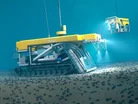The Metals Company Sweeping Sea Bed for Battery Materials

TMC faces financial challenges as it develops technology to harvest polymetallic nodules from the Pacific Ocean for use in electric vehicle batteries
Deep-sea mining firm The Metals Company (TMC) is developing technology to harvest polymetallic nodules from the Pacific Ocean floor, reports Forbes.
These nodules, formed over millions of years, contain nickel, manganese, cobalt, and copper -- metals crucial for electric vehicle (EV) battery production.
Gerard Barron, Chairman and CEO of TMC, tells Forbes such metals are vital for the transition to low-carbon energy.
"We need much more metal as we move to lower carbon energy, and this is how we can get those metals with the lightest impact," he says.
TMC went public in 2021, raising $570mn. However, the company has faced financial challenges since its initial public offering.
Future prospects for The Metals Company
In its 2023 full-year results, TMC reported a total cash burn of $60mn against $20mn raised. The company's cash reserves dwindled to $7mn by the end of the year.
Despite these setbacks, Barron told Forbes he remains optimistic, adding that its largest shareholders have agreed to loan it another $45mn – “enough to get through one more year of permitting and bureaucracy", he says.
He adds that his company has also pushed back its timeline for commencing commercial nodule collection from 2025 to mid-2026, citing regulatory hurdles and rulemaking processes.
TMC's deep-sea mining technology and operational plans
TMC plans to deploy a 750-foot-long former deep-water drill ship for its mining operations. The vessel was provided by Allseas, a Dutch offshore engineering company that also built the robotic nodule collector machine.
The company's initial harvesting area will be in the Clarion Clapperton Zone, a region known for its high concentration of polymetallic nodules. TMC has secured permits to mine 90,000 square miles of sea floor, sponsored by the island nations of Nauru, Tonga, and Kiribati.
Barron explains the harvesting process: "The bright yellow collection machine, about 30 feet long, is controlled from the ship via an umbilical cord. It shoots air jets into the sand to loosen nodules, then sucks them up."
Opposition to deep-sea mining
Environmental organisations such as Greenpeace have expressed concerns about the potential ecological impact of deep-sea mining.
Marine scientists worry that harvesting nodules could disrupt seafloor ecosystems and harm marine life.
The International Union for Conservation of Nature, a membership union of government and civil society organisations, has called for a ban on deep-sea mining.
Barron says of such concerns: "Critics of deep-sea mining are wrong on this one, like they were on nuclear."
He adds: "This is not like drilling for oil where it all just turns into carbon dioxide. These metals will be used and recycled."

